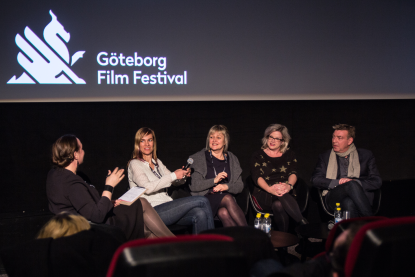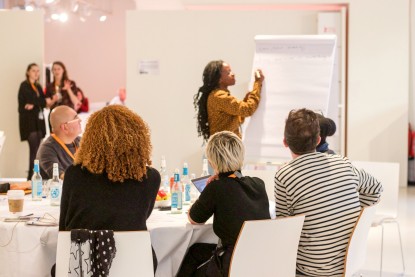Industry Reports
The selected industry reports below provide further insights into relevant topics of the film industry and beyond. The content of the listed reports reaches from building on topics previously discussed in the EFM Horizon programme to being of general interest concerning recent developments of the film industry.
In their resources section, the EFM’s initiative Diversity and Inclusion offers reports on related topics.
Contact
EFM Horizon
Berliner Freiheit, 10785 Berlin
Nostradamus Report: "A Creative Explosion"
presented by the Göteborg Film Festival

The 7th Nostradamus Report "A Creative Explosion" offers a deep but high-paced look into topics such as the upcoming feature film renaissance, strategies for producers and local industry to thrive in the escalating streaming wars, and the normalisation of alternative release patterns.
Download PDF
Sustainability in Film and Television - Workshop 2020 Report
This year, the German Federal Government Commissioner for Culture and the Media, the German Federal Ministry for Environment, Nature Conservation and Nuclear Safety, and the European Film Market of the Berlinale co-hosted a workshop for a selected group of sustainability experts and industry pioneers leading change in film and television.
Roundtable discussions explored sustainable production certification and awards, public funding for sustainable media projects, sustainability for distribution and its tech, as well as strategies for sustainable events and festivals.
Download PDF
Challenging Distribution 2020
At this year's Challenging Distribution working session, streamers and distributors alike shared knowledge and successes in their ever-changing landscape. Deepak Jayaram of myNK, a blockchain-powered VOD platform in India, mentioned how his company is encouraging conversation between its subscribers by providing chatroom capabilities, allowing viewers to feel more like cinephiles and creators themselves through sharing user-created content like film mashup videos and memes. This has greatly boosted customer retention but also helped myNK define different niches in their large market, certainly a unique challenge for a startup in a country of over 1 billion. Above all, digital distributors must be willing to constantly adapt, with market changes and technological developments in no sight of slowing down.
Download PDF
The Looking Glass
Report on Mental Health in the UK Film, TV and Cinema Industry
The success of film, TV and cinema in the UK is driven by the imagination, expertise and hard work of people working within the industry. Against a context of growing concerns about the mental health of the UK workforce generally and the working culture and practices of this industry particularly, the Film and TV Charity commissioned the Work Foundation to understand more about the perspectives and experiences of those working behind the camera. The work sought to assess the prevalence of mental health problems; explore whether there are particular challenges associated with working life in film, TV and cinema; and consider how people working in the industry could be better supported to manage their mental health. The conducted survey, the Looking Glass, received 9,399 responses, of which 4,877 responses included enough demographic information to enable detailed cross-sectional analysis. The high levels of engagement with the survey are a testament to the rising tide of feeling about this issue within film, TV and cinema.
The results make for sombre reading. Prevalence of mental health problems is higher among people working within this industry than across the UK. This ground-breaking new research has uncovered a series of underlying factors which may be contributing to this. These include industry culture, working conditions, and limited capability to provide workers with the support they need.
Download PDF
Related Link
"Re:Vision" Report 2019
A Think Tank Towards Inclusion

Following up on the inaugural Re:Vision Forum at IFP Independent Film Week in September 2018, the second Re:Vision Think Tank at EFM aimed to expand the conversation on industry inclusivity and provide actionable, concrete solutions that can be employed immediately and/or within the very near future. Bringing together a diverse range of industry, from filmmakers to executives to festival leadership and those working to ensure transformative change in the industry today, a range of ideas and strategies were discussed, following three guiding questions.
Download PDF
Related Links
“Climate Crisis: The Unsustainable Use of Online Video”
Report on the environmental impact of Information and Communication Technology
Digital technologies now emit 4% of greenhouse gas emissions (GHG), and its energy consumption is increasing by 9% a year. The Shift Project published in March 2019 the rapport “Lean ICT – Towards Digital Sobriety” (2019). In it, it is recommended making digital transition compatible with climate imperatives and the constraints of resources. Digital sobriety consists in prioritising the allocation of resources as a function of uses, in order to conform to the planet’s physical boundaries, while preserving the most valuable societal contributions of digital technologies. This requires questioning the pertinence of how we use digital technologies, one of which is online video whose use we focus on in this new report.
Related Links
"Lean ICT: Towards Digital Sobriety"
Report on the environmental impact of Information and Communication Technology
The energy consumption of Information and Communication Technologies (ICT) is increasing by 9% every year. It is possible to limit this growth to 1.5% per year by moving to sober digital practices. The digital transition as it is currently implemented participates to global warming more than it helps preventing it. The need for action is therefore urgent. Such is the main conclusion of the carbon transition think tank The Shift Project’s report on the environmental impact of ICT.
